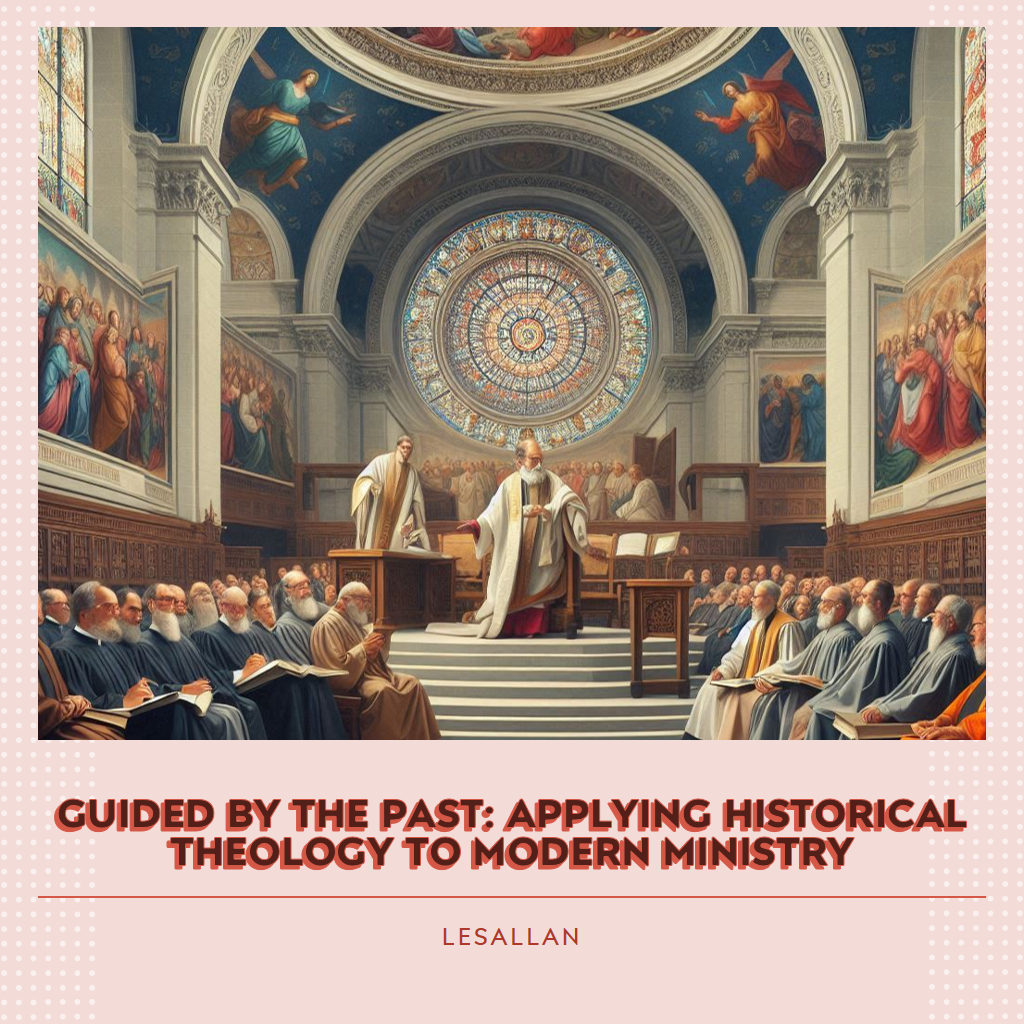June 20, 2024

Guided by the Past: Applying Historical Theology to Modern Ministry
Lesallan Bostron
Ohio Christian University
THE2300 Historical Theology I (ONLSP242)
Dr. Trent Lambert
June 20, 2024
Guided by the Past: Applying Historical Theology to Modern Ministry
The course Historical Theology I at Ohio Christian University in 2024 (Ohio Christian University, 2024) has equipped me with a deep understanding of the church’s history, providing invaluable insights that are essential for effective leadership in my ministry and for living a fulfilling life. This reflection seeks to delve into how the knowledge gained from this course will influence my life and ministry, emphasizing the key concepts learned and their relevance to my current and future endeavors.
Church history is more than just a compilation of facts; it is a complex tapestry of experiences, decisions, and events that have influenced the faith and traditions of successive generations. Through the study of church history, we gain valuable insight into how our forebears effectively tackled challenges reminiscent of those we encounter today. Their shortcomings also provide us with important lessons, enabling us to steer clear of repeating past mistakes. This historical perspective is crucial for guiding the church into the future with prudence and insight.
One of the most enlightening concepts I gained from this course is the significance of doctrinal development. Delving into the formulation and defense of key doctrines throughout history enables us to grasp the depth and intricacy of our faith. In 325 AD, the Council of Nicaea significantly contributed to the establishment of the doctrine of the Trinity, which is integral to Christian belief. Exploring the struggles and debates that culminated in this definition has heightened my reverence for the theological underpinnings of my faith.
An essential lesson to consider is the impact of reform movements in rejuvenating the church. The Protestant Reformation, directed by powerful figures like Martin Luther (1483-1546) and John Calvin (1509-1564), was a noteworthy movement in the history of Christianity; these figures questioned established norms and brought about significant changes in church customs and doctrines. This historical event emphasizes the significance of embracing reform and revival in our current era to uphold the church’s vibrancy and pertinence.
Studying church history has deeply influenced my personal life and ministry. On a personal level, delving into the historical evolution of doctrines and practices has fortified my faith and established a firm groundwork for my beliefs. This understanding enables me to participate more assuredly in theological conversations and to articulate and defend my faith with increased clarity and certainty.
I intend to utilize these historical insights in my ministry in various ways. Firstly, I will prioritize the significance of doctrinal soundness, guaranteeing that our teachings are firmly grounded in the profound theological legacy of the church. This will involve not only instructing on the fundamental doctrines but also elucidating their historical progression and importance.
Second, I aim to foster a culture of reform and revitalization within the church. Similar to the reformers of the past, it’s important for us to thoughtfully assess our practices and be open to making essential changes in order to remain faithful to the gospel. This may include embracing new approaches to outreach, tackling societal challenges, or reconsidering long-held traditions to ensure they effectively meet the needs of my community.
I plan to draw inspiration from historical examples to motivate and uplift my congregation. I believe that the stories of faithfulness, courage, and perseverance from church history can serve as powerful reminders of God’s faithfulness and the enduring strength of the church. Connecting our present challenges to the experiences of past generations can provide us with encouragement and guidance for our journey.
After completing the course “Historical Theology I” at Ohio Christian University in 2024 (Ohio Christian University, 2024), I have gained invaluable insights into the rich history of the church. This course has equipped me with essential lessons that are instrumental for leading effectively and living well. By delving into the successes and failures of past generations, I am now better prepared to navigate contemporary challenges and lead my ministry with wisdom and discernment. The teachings from this course will not only fortify my personal faith but also steer my endeavors to promote doctrinal soundness, advocate for reform, and uplift my congregation. Looking ahead, the wisdom gleaned from church history will serve as a precious resource, enabling us to live faithfully and lead with vision and courage.
References:
Ohio Christian University. (2024). THE2300 Historical Theology I (ONLSP242). Retrieved from
Ohio Christian University website.



1 Comment
Broadband Internet Speed Test · June 24, 2024 at 10:30 pm
I share your level of enthusiasm for the work you’ve produced. The sketch you’ve displayed is refined, and the material you’ve authored is impressive. Nevertheless, you seem anxious about the prospect of heading in a direction that could cause unease. I agree that you’ll be able to address this concern in a timely manner.
Comments are closed.